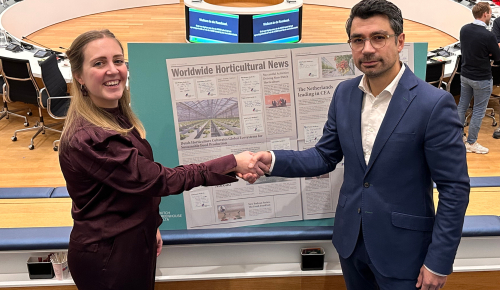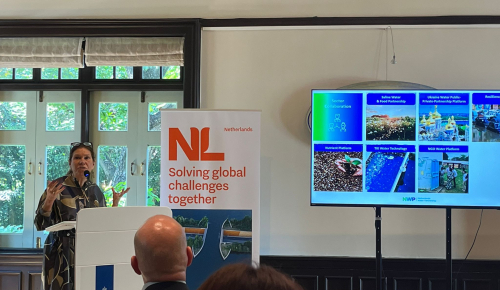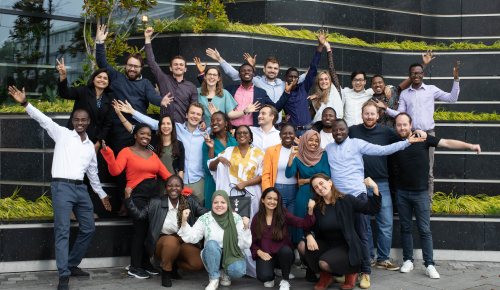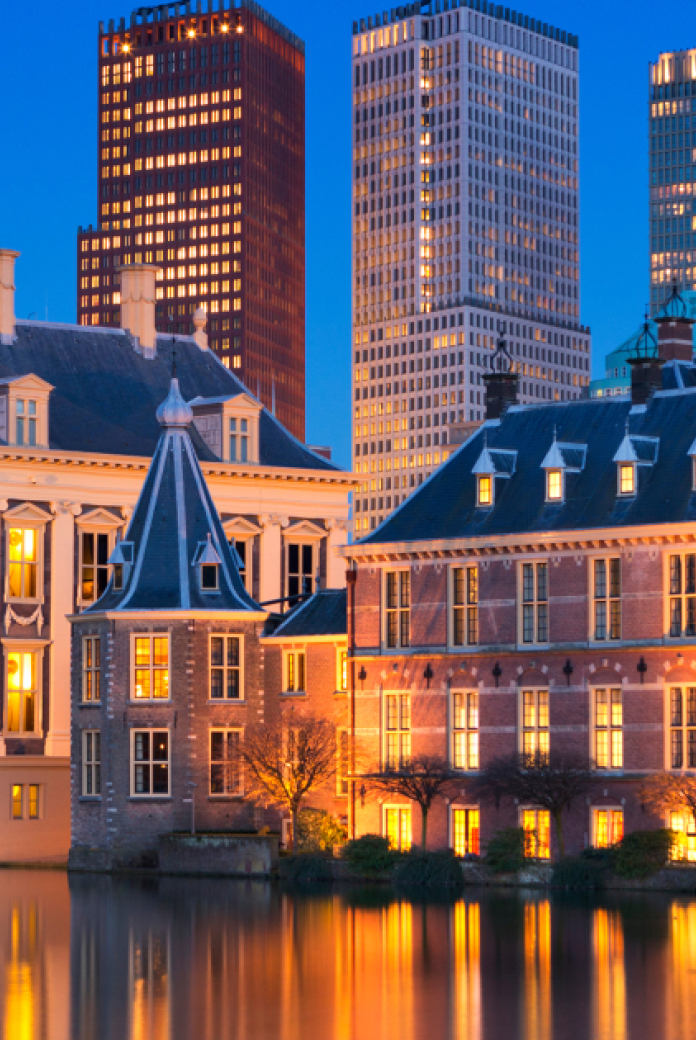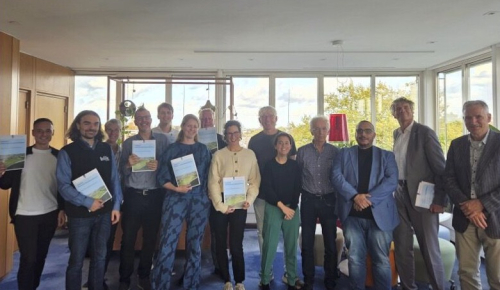Blog
5 December 2019Morocco appreciates Dutch expertise in urban resilience
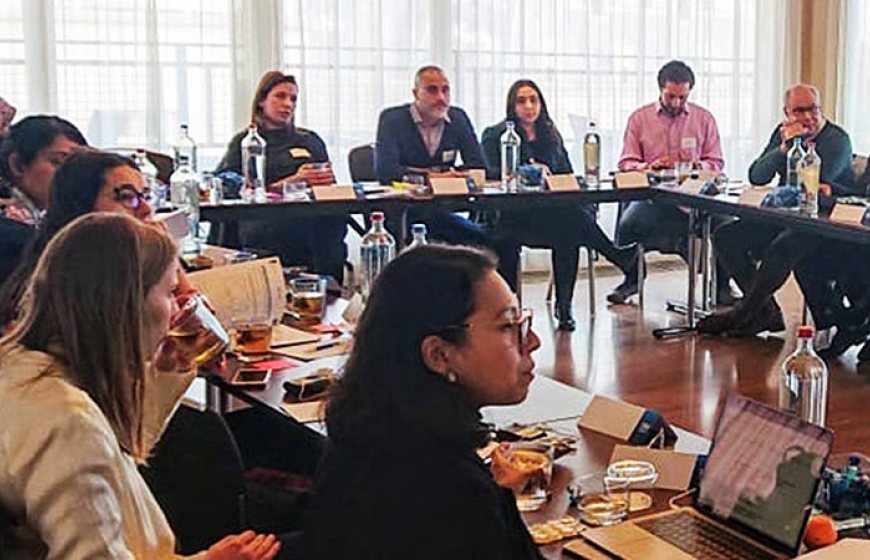
Last week, a delegation of urban planners from Morocco visited the Netherlands to learn about Dutch expertise, practice, and research on urban resilience, stormwater management, water governance, and rainwater harvesting. Janett Tapia, Project Manager on Urban Resilience at the Netherlands Water Partnership (NWP) welcomed the visitors’ positive reactions and the opportunities identified for further cooperation in the near future.
‘Morocco is vulnerable to the effects of climate change in both urban and rural areas. The country has a dry season and a wet season in which rainfall patterns and droughts challenge the infrastructure of its cities and countryside. The Moroccan delegation came to the Netherlands looking for high-quality, sustainable solutions that could be used for the long term. For the group, this study trip was not only a great opportunity to learn about Dutch technologies, but they were also keen to understand the background systems of water governance and collaboration between government, industry and knowledge institutes.
Nice cross-section
The programme gave a nice cross-section of what the Netherlands has to offer in terms of urban resilience, from policy-development and scientific research to governance and innovative solutions. In Rotterdam, the Municipality gave a presentation which offered lots of insights into the transition the city is undergoing to reach its resilience goals. We showed our visitors the Luchtsingel roof garden which is the largest rooftop farm in Europe and a test site to experiment with rooftop technologies and farming in cities. Rotterdam already has 360,000 square metres of green roofs and a very active programme to incentivise more. For instance, the Life@Urban Roof programme subsidises experimentation in roofs to generate innovation in the development of multifunctional roofs that integrate green (focus on greening and fostering biodiversity), blue (focused on stormwater), yellow (focused on energy), and red (focused on social spaces), and capitalize from combining these functions.
Water Sensitive Cities
In Delft, we visited the WaterStreet, an experimental living lab where innovative solutions on the reuse of rainwater are developed. The delegation learned about the concept of ‘Water Sensitive Cities’ and its emphasis in planning for cities seeing water as a valuable resource and using it as an opportunity in different scales, designing the built environment supporting natural water functions and having a stakeholder decision-making culture that acknowledges the water. The delegation showed great interest on how this concept of ‘Water Sensitive Cities’ could help manage Morocco’s urban challenges by using the surplus of water during the rainy season. An important shared finding throughout the trip was that in the Netherlands, urban resilience is not only a matter of hardware, infrastructure and government obligations, but also of collaboration with local communities, innovative firms and governmental entities. We also learned how incentives, rather than strict rules, can ease the process of making cities more resilient.
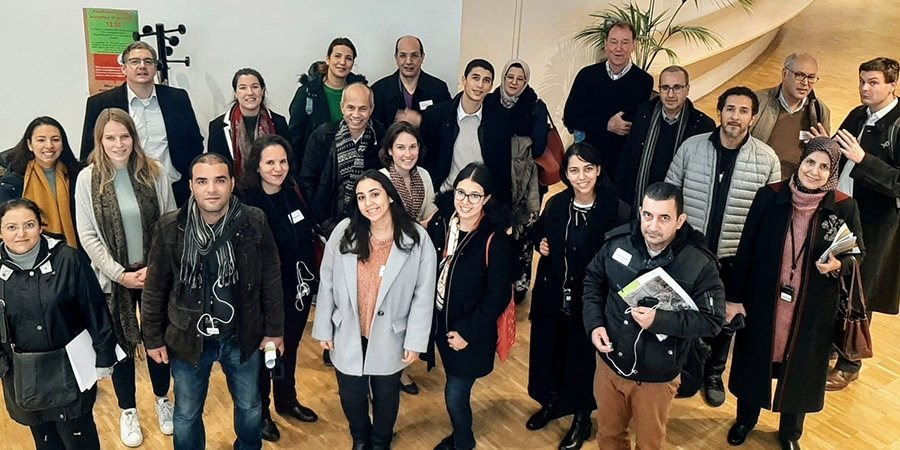
Group photo of the delegation including representatives of the Moroccan Ministry of Equipment, Transport and Logistics and Water; Ministry of National Land Planning, Urban Planning, Housing and Urban Policy; and the Ministry of the Interior. Furthermore, representatives from the 'Caisse de dépot et de gestion'', Gesellschaft für Internationale Zusammenarbeit (GiZ) and the Dutch Embassy in Morocco.
Future cooperation
The visit generated a number of valuable contacts and a better picture of future cooperation. One of the possible options is to set up a pilot project in collaboration with NWP members IHE Delft and Deltares. Our visitors are now developing a guide of best practices that could be adapted to the context of Morocco. They had the chance to establish good relationships with Dutch firms and organisations that have the expertise and track records. Both the delegation and the NWP are eager to continuing working together to find opportunities for partnerships in the region, as we saw multiple areas where need and opportunity coincide.
The visit from the Moroccan delegation is a great example of how NWP can help urban resilience professionals in the public and private sector, and knowledge institutions abroad find the right combination of Dutch expertise and specialised knowledge to collaborate and form partnerships to help them resolve issues unique to their region.
Personal view of the Dutch sector
As for me, I am relatively new at NWP. As an urban planner, I was mainly working on urban resilience and master planning on the ground in different states in the USA, Europe and the Pacific. At NWP, I facilitate bringing supply and demand together while connecting the Dutch water sector with opportunities abroad. With my knowledge and expertise, I help cities, regions and organisations shift to resilience, adaptation, mitigation and sustainability, and I invite urban resilience professionals in need of specialised assistance for their community, to reach out to me (j.tapia@nwp.nl).
It is great to be closely involved in the Dutch water sector, especially for firms focusing on resilience. Before I worked in the Netherlands, I often looked at the Dutch for examples of innovation in planning with nature and best practices. In the USA, we saw the Netherlands as having the technology, as well as the drive and an encouraging system to create out-of-the-box sustainable, circular and integrated solutions that can be used for the long term while always considering quality of life at implementation. In addition, we see the Dutch approach as relying on the close cooperation of government, business, knowledge institutes and NGOs. This makes the whole more than the sum of its parts. At NWP, I can show that to the world.’
